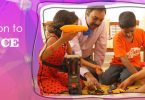Crisis is an oft-used word to describe a vast number of issues, from the “garbage crisis” in a city to “identity crisis” that a teenager may experience to “midlife crisis” later in life. However, what does crisis actually mean? Is crisis uncommon in marriage or is it something that can be present in a marriage at any stage? Crisis is a complex word which in its essence means ‘turning point’. A sequence of events may lead to a tipping point where the next step, decision or direction taken can either build or destroy. Triggers for being in crisis can range from a single life changing event or a sequence of events that leads to a “turning point” or “crisis”.
Boundaries and Crisis
Rajan, being the youngest in his family, was considered their star member. His two sisters doted over him and even went on to decide on a girl they thought would suit him best. Rajan married Latha because he implicitly trusted his sisters’ decision. Rajan tried to win his wife’s approval and at the same time continued to please his siblings.
This is the most important family life cycle stage as it is where the spousal unit is being formed. The most important task here being to draw a boundary within which the marriage relationship derives its healthy exclusiveness. Ideally, it is here that a couple learns to be vulnerable enough to build the seeds of friendship, transparency and trust. Often, it is the year when emotions run high, from passion, insecurity, tenderness, hurt and trust. A lot is at risk here as each individual takes up the responsibility of a life change and all this as a team player with their spouse. While a few sail through smoothly, many may experience a crisis sooner or later.
‘People pleasing’ was so ingrained in Rajan’s person that it became close to impossible to please his sisters and his wife at the same level. Always smiling Rajan began snapping under the pressure of being indispensable to two very primary relationships in his life. Within a few months he reached a crisis situation of running the risk of losing his marriage.
There comes a time when eventually a person learns to see himself as an individual, a part of the family yet an individual member who retains one’s own identity. A person who has healthy relationships has courage, confidence and a sense of balance to lovingly draw boundaries which are flexible, protective and present. Rajan needed to prioritise his marriage… he needed to put protective boundaries which respected the exclusivity of his marriage relationship. It was important for him to redefine yet maintain his relationship with his sisters.
Enmeshment and Individuality:
When families have closed and tight boundaries around their family unit, coupled with diffused boundaries between each other, this may lead to over-identifying, manipulation or over-dependence especially on an emotional level with another member (between husband and wife or parent and child). This unhealthy dependence can limit an individual family member from developing a sense of self-worth and identity. Their poor sense of self may interfere in their ability to function healthily in relating to themselves and others.
Storms and Crisis
Roopa and Rahul lost their fifteen-year-old son in an accident; affectionate Rohan’s death had left them devastated. The initial shock led to days of being unable to come to terms with their loss. Roopa and Rahul coped by throwing themselves into life and grieving their loss inwardly. Unable to turn to each other they drifted away. They changed from being the lovers they once were to now being strangers to each other.
Be Strong
Somewhere driven within individuals is the drive to appear strong. Strength is defined as composure, sans emotion, going about the usual routines efficiently. Sometimes individuals experiencing tragedy wear superficial strength. ‘How are you feeling now?’ from well-meaning people, can almost sound like ‘You must get your act together’. There are some devastating storms, especially death of a child which ranks as the most heart breaking grief that can be experienced by a person. The ‘be strong’ driver, a coping mechanism, doesn’t allow the person the freedom to grieve, to reach out for comfort from their spouse or to share the pain. Timely grieving helps healing to begin and then strength emerges as a result of truly dealing with the loss.
Crisis and Burn-out
In their 40s and in the prime of their career with growing children, Shanti and Samuel were up to their necks with responsibilities and activities. From being a part of church activities, dropping and picking their teens from their various practices, taking care of aged parents, staying late at work to retain their positions… life was so busy. The family looked so accomplished on the outside, hitting the right notes with everyone as they held good jobs, their children were academic toppers, they were financially secure, they were socially respected… but Shanti and Samuel were burnt-out on the inside, feeling that something was amiss, even lost! They were in a crisis!
Be Perfect
To be perfect receives applause. To be perfect simply means that everything is in place, beautiful to look at and unbelievably flawless. Sometimes, unknowingly this drive (to be perfect) can make people concentrate unduly on the need to have everything look good. In the process, permission is not given to enjoy the moment, to laugh at their human flaws, to stop and rest. Being perfect may stop Shanti and Samuel from living in the moment, resting and celebrating life for the ‘here and now’. That explains the discontent that though they were living life, they were ‘rushing through it like a speeding train’.
The Crisis of Neglect
Sudha and Vijay were married for 45 years; their children were married and lived out of the city. It was an ‘empty nest’ finally. The familiar routines of him reading the newspaper and her being busy in the kitchen bound them together; apart from that, they fought. They fought bitterly about past stories of failure, lack of support and disappointment. It didn’t dawn on them that with their children leaving home, they had reached a crisis point in their marriage where sporadic outbursts were emerging.
Disengagement
While enmeshment lies on one end, disengagement lies at the opposite end of the continuum. Disengagement simply means having nothing to do with one another. When companionship in marriage is forgotten, it is replaced or compensated elsewhere. It could be replaced by another person, the parent-child relationship takes precedence or work may become priority. In the meanwhile resentment can pile up unknowingly, which will lead to a buried marriage. Sudha and Vijay need to accept that their marriage needs fresh love, with grown children having left home; they stand a chance to draw a boundary yet again around this exclusive relationship. It is a risk to be vulnerable, and it takes humility to forgive, yet it is worth the effort.
Crisis in medical terms is considered a crucial point in a disease where a person can either recover or deteriorate. A marriage can be reclaimed when two imperfect people strive to not accept defeat in their marriage. Sometimes couples who have survived the worst see better times because one of them or both of them choose to fight for the health of their marriage. One can play victim to the ravages of the storm or choose to survive it and then bask in the sunshine. There are those who have done so sooner or even later. Marriage is not about simplistic or quick fixes, it is the grace one dons to make it a commitment of love, celebration and rainbows!





